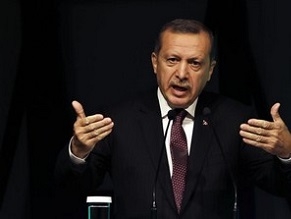|
World Jewish News

Turkey's Prime Minister Tayyip Erdogan. Photo: REUTERS/Murad Sezer
|
Turkey protests may restrict Erdogan’s foreign activism
25.06.2013, Israel and the World The unrest in Turkey is forcing Prime Minister Tayyip Erdogan to expend his political capital at home, possibly leading to a more relaxed foreign policy.
The demonstrations, which began in May, continue to reverberate as authorities arrested 20 in a raid in Ankara on Tuesday.
Erdogan’s efforts to quash the protests and have his supporters hold rallies across the country could mean, contrary to what some analysts are saying, that he may double down not only at home, but also abroad.
Some of the first foreign policy consequences of the government’s crackdown were felt on Tuesday, when the EU postponed a round of membership talks with Ankara to October. The Istanbul-based Hurriyet Daily News attributed the delay to Europe’s disapproval of the clampdown. Though Turkish admission to the EU has long come up against resistance among some member states, the current protests have bolstered these voices.
The report by the BBC on Monday that Turkey is intimidating its journalists will not improve matters.
And on the US front, despite President Barack Obama’s close relationship with Erdogan, it seems that these protests could sour how American decision-makers view the Turkish leader.
To Turkey’s south, the Syrian civil war rages and despite strong rhetoric from Erdogan and some support for fellow Sunnis fighting in the opposition, Ankara has not taken military action against the Assad regime.
Soner Cagaptay, director of the Turkish Research Program at the Washington Institute for Near East Policy, told The Jerusalem Post that Turkey now has “an opposition movement that transcends the parliament, taking its organized voice to the streets.” It will be able to challenge Ankara’s Syria policy, he said.
Cagaptay expanded on this point: “Currently many Turks want Assad to go, but many of them also do not support Ankara’s Syria policy which they think has exposed Turkey to the fallout of the Syrian war. Accordingly, the new street opposition is likely to check Ankara’s Syria policy.
“This suggests that Turkey is going to compete with the United States to lead from behind in Syria,” he added.
Mustafa Akyol, a columnist for Hurriyet and the author of the book, Islam without Extremes: A Muslim Case for Liberty, agreed, telling the Post the protests will further restrict Ankara’s room for maneuver in Syria by focusing the attention of the government on domestic troubles rather than foreign policy.
“A Turkish intervention in Syria, which was already unlikely, is now unimaginable,” he said.
However, despite analysis that Turkey has lost much of its ability to act in Syria and other areas, the country still is more likely to act in critical regions, according to Anat Lapidot-Firilla, a Turkish expert and senior research fellow at the Van Leer Institute in Jerusalem.
Lapidot-Firilla points out three exceptions to what she calls Turkey’s strategic retreat. First, she said, Turkey is unlikely to stop its involvement in the Kurdish autonomous region in Iraq. Second, and related to the first point, Turkey will continue to press ahead at full speed with its plans to secure the flow of natural gas, which is badly needed for its industry and its goal of becoming an energy hub.
Lastly, Turkey’s election campaign is starting and therefore Erdogan will most likely continue the country’s activity related to the Palestinians and the Gaza Strip, as it can always be used to distract the public from domestic troubles.
“Gaza is a treasure” for the Turkish regime, she said.
But on Syria, a bark but no bite policy may continue. For example last month, Erdgoan said Syrian President Bashar Assad will “pay a very, very heavy price” for mass killings.
Burak Bekdil, a columnist for Hurriyet, told the Post Erdogan may now ramp up the rhetoric again to score some political points.
The trouble for Erdogan, said Bekdil, is that he is not sure how he can do this without risking a Syrian response, or one from one of its allies – Iran, Russia, or China.
By ARIEL BEN SOLOMON
JPost.com
|
|
